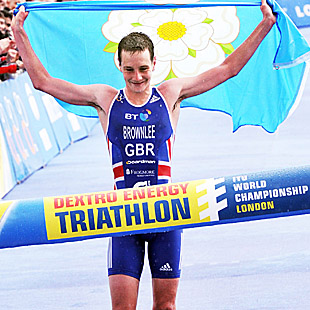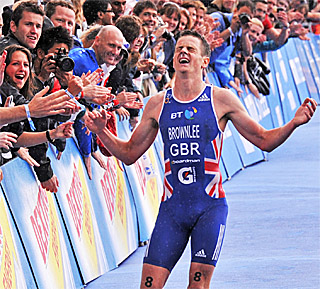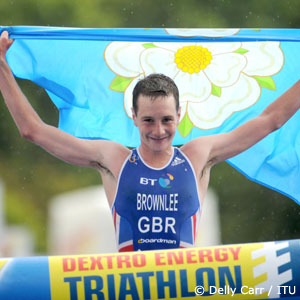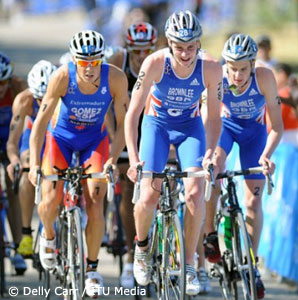The Brownlees’ London strategy

Alistair and Jonathan Brownlee have proven to be a formidable force in ITU racing not only because of their physical gifts but because they share a fine tuned grasp of draft legal strategy. It was tough enough on the competition that Alistair has now won 11 World Championship Series events in the three years it’s been in existence. Such dominance has not been in men's ITU racing seen since fellow Brit Simon Lessing was at his peak nearly two decades ago. Now competitors must think it is ominous when brother Jonathan won the Junior Worlds and has been matching his older brother's amazing run splits and running up front in all the toughest races on the circuit. Those finishes include a second place at London in 2010 when Alistair unexpectedly blew up with the heat in the home stretch and two more second place WCS finishes this year.
None other than 2008 Olympic champion Jan Frodeno puts Jonathan ahead of Alistair in his predictions for top threats at London 2012. After all, thinks Frodeno, Alistair is human – he lost much of 2010 to recurring stress fractures. And it is even tougher on the rest of the triathlon world when the brothers get together at the front and operate with a sort of built-in wireless extra sensory perception of race tactics and strategy.
So it was somewhat of a shock to the two of them when Alistair seized on a fast-opening break at the London round of the World Championship Series Sunday and Jonathan was left behind in a slowly receding chase pack. While both were a little shook up to be separated, they made the very best of circumstances and the decisions they made were as subtle and nuanced as chess masters operating in the fast-paced world of ITU racing.
Alistair Brownlee: On whether it was a conscious choice to join a break away without his brother at London It came about absolutely naturally. I saw James Elvery [of New Zealand] pushing it [early on the bike] and jumped on it. Once I got up there with Elvery [and Alexandr Brukhankov and Ivan Rana] I was working hard but not too hard. I thought it was quite a good position to be in. It was safe, uncrowded and under control. You had to watch it on the corners because it was wet and gets slick and lot of people were crashing behind us.
Jonathan Brownlee: Having Alistair go off ahead was completely different. Normally we are in the same pack. Normally we work together. From the start there were attacks all the time and with that one, for some reason, I stayed. I think it was right after the start it happened so quick. When they started to pull away, the gap was 10 seconds and stayed there. We could see them for ages. When I saw Alistair go ahead, I was chasing down a few people trying to bridge across. Just to make sure if they did succeed I was there as well. Then people lost interest really. There was no one chasing. For so many the aim was top 10 or top 12 to make their Olympic teams, not the podium.

Alistair: Getting separated from Jonny might have been a blessing. There was also a danger of that we would be attacked continuously if Jonny and I were in a group. We didn’t want to spend energy chasing them all down. So I thought it became a good tactic. I couldn't have predicted we'd got 75 seconds by the end of the bike. That was a big shock when I started getting those calls [about the widening gap] . So I stopped working on the last lap to slow us down enough to give Jonny a chance of running up to second.
Jonathan: The break was a surprise. But Alistair going ahead might have helped me because then I didn’t have to work as hard. When they got a minute ahead, I knew second place was gone. I didn't really want to chase the break alone because so many guys were quite happy to stay back and just sit there and get a top eight needed for Olympic qualification. I didn’t want to chase alone. But I didn’t want it to get more than a minute — I preferred it to be about 30 seconds. It was really, really hard race. But I came top three.
Alistair: It was not something we could have predicted, but the way it worked out was pretty clever. Glad we were not among those who crashed. The big goal of the day was to make sure we were both on the podium and satisfied the British Federation Olympic selection criteria.
[Jonathan Brownlee had the fastest 10k, 29:34, and left Javier Gomez (29:46 run) behind in fourth place. Jonathan cut his brother's advantage by 16 seconds, but fell short of Brukhankov, who cinched 2nd place with an 11th-fastest 30:15 run.]
While the brothers are very supportive of each other, they have no reservations, such as the reluctance of the sisters Venus and Serena Williams to compete against one another in tennis, about a fight to the finish.
"I'm improving all the time," said Jonathan. "But Alistair is improving as well. All you can do is train as hard as you can and hope you don’t get injured and so increase your volume and intensity gradually."
London, with its sometimes slippery fast corners on the bike and the grass and mud and off camber cross-country style run adds to Jonathan's Why Can't I? optimism. "Because on this track anything can happen," said Jonathan. "Next year I might be on the breakaway. And Alistair might be a minute behind me. So all I can do is try my hardest and wait until next year."



